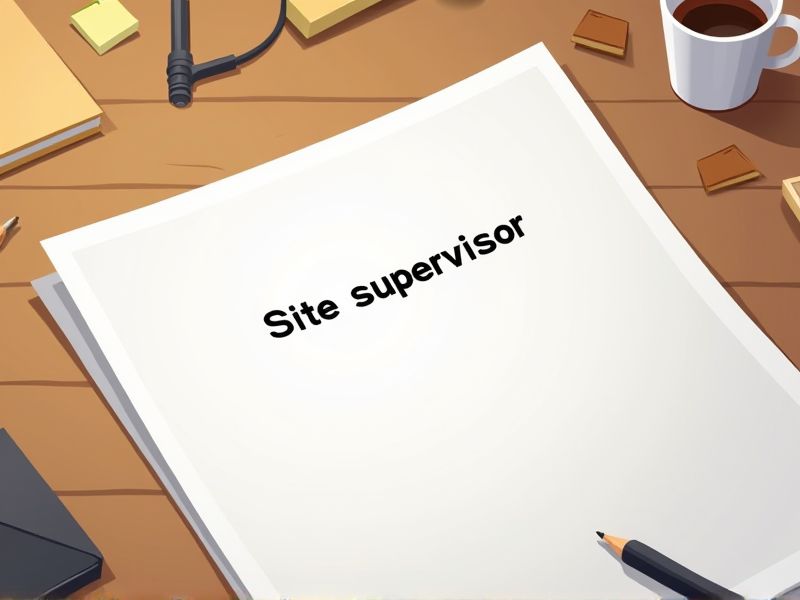
Site supervisors play a critical role in ensuring construction projects are completed safely, efficiently, and within regulatory guidelines. Certifications provide them with the necessary skills and knowledge to manage complex tasks and navigate industry standards. Without the proper credentials, they might face challenges in understanding safety protocols and project management techniques. Here are some key certifications essential for a Site Supervisor.
OSHA 30-Hour Construction Safety Certification
Site supervisors with OSHA 30-Hour Construction Safety Certification are better equipped to identify potential hazards, which reduces the likelihood of accidents. The training increases their understanding of OSHA regulations, ensuring compliance and avoiding costly fines. Knowledge gained from the certification fosters a safer work environment by promoting proper safety practices among workers. Enhanced safety protocols lead to improved project timelines and reduced liability issues.
First Aid & CPR Certification
A Site Supervisor's role involves overseeing safety on a construction site, where accidents and injuries can occur frequently. Possessing first aid and CPR certification equips them with essential skills to promptly respond to medical emergencies, potentially saving lives. The certification enhances the supervisor's ability to manage workplace incidents and maintain a safe work environment. Employers and regulatory bodies often require these certifications to ensure compliance with safety standards and reduce liability risks.
Fall Protection Certification
Site supervisors often oversee environments where workers are exposed to heights, leading to potential fall hazards; fall protection certification equips them with vital skills to assess and mitigate these risks. Certification ensures that supervisors understand and comply with OSHA regulations, which reduces the chances of legal issues and associated fines. Enhanced knowledge in fall protection strategies translates to a safer work environment, decreasing accident rates and fostering a culture of safety. Certified supervisors can effectively train their teams, promoting consistent and standardized safety practices across the site.
Project Management Professional (PMP) Certification
Site supervisors often encounter complex construction challenges; possessing a PMP certification equips them with structured project management skills to handle these hurdles efficiently. The certification ensures familiarity with industry standards, fostering better communication and coordination among team members. It enhances supervisors' abilities to manage project timelines, budgets, and resources effectively, reducing the risk of errors or delays. Organizations value PMP-certified professionals as they demonstrate a commitment to continuous learning and adherence to best practices, which can lead to more successful project outcomes.
Certified Construction Manager (CCM) Certification
The Certified Construction Manager (CCM) certification ensures site supervisors possess comprehensive knowledge of construction management principles, improving project outcomes. It enhances credibility and trust among clients and stakeholders, which leads to increased business opportunities. CCM-certified supervisors consistently demonstrate adherence to industry standards, promoting safety and regulatory compliance on sites. By integrating best practices and methodologies, certified managers effectively mitigate risks and reduce project costs.
LEED Green Associate Certification
Possessing a LEED Green Associate Certification equips a site supervisor with a comprehensive understanding of green building principles, enhancing their ability to oversee sustainable construction projects. With this certification, a site supervisor is more adept at implementing energy-efficient and environmentally responsible practices on site. Clients increasingly demand sustainable building, so having LEED expertise can make site supervisors more competitive in the job market. Knowledge gained from this certification can lead to fewer construction errors and improved environmental compliance, benefiting both the project and the company.
Construction Skills Certification Scheme (CSCS) Card
Possession of a Construction Skills Certification Scheme (CSCS) card for site supervisors ensures that individuals have the necessary qualifications and training to oversee construction projects safely. The card verification process helps maintain high health and safety standards on job sites by confirming a supervisor's competence. Employers require CSCS cards to comply with industry regulations and reduce the risk of work-related accidents. Holding a CSCS card enhances a supervisor's credibility and employability within the construction sector.
Confined Space Entry Certification
Confined Space Entry Certification equips site supervisors with the necessary skills to identify potential hazards within enclosed areas, reducing risk of accidents. This certification ensures adherence to safety regulations, minimizing legal liabilities and ensuring compliance with workplace safety laws. Trained supervisors can effectively implement emergency procedures, enhancing response times in case of incidents. Knowledge gained through this certification also fosters a safer work environment, leading to higher worker morale and productivity.
Scaffold Safety Certification
Scaffold Safety Certification ensures that site supervisors have a thorough understanding of the regulations and best practices, which reduces the likelihood of accidents on construction sites. Trained supervisors are better equipped to identify and mitigate potential hazards, leading to safer working conditions for the crew. Proper certification also aligns with legal requirements, minimizing the risk of costly fines and legal issues. Personal accountability and professional competence are enhanced through certification, promoting a culture of safety and efficiency.
Hazard Communication Certification
Site supervisors need Hazard Communication Certification because it ensures they understand the proper handling and labeling of hazardous materials. This knowledge prevents workplace accidents and promotes the safety of all personnel. Certification empowers supervisors to implement effective communication plans, reducing the risk of chemical exposure. With this, compliance with OSHA regulations is maintained, which minimizes potential legal liabilities.
Summary
When you obtain certifications as a site supervisor, your professional credibility and competence will likely increase. This enhanced skill set can lead to improved project management, ensuring higher efficiency and safety on job sites. Your ability to implement best practices may lead to better team performance and job satisfaction. Consequently, earning certifications can pave the way for potential career advancements and salary increases.
